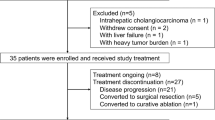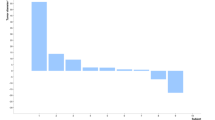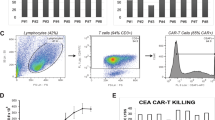Abstract
Both replication-incompetent and replication-selective adenoviruses are being developed for the treatment of cancer and other diseases. Concerns have been raised about the safety of intra-vascular adenovirus administration following a patient death on a clinical trial with a replication-defective adenovirus. In addition, the feasibility of vascular delivery to distant tumors has been questioned. dl1520 (ONYX-015) is a replication-selective adenovirus that has previously shown safety and antitumoral activity following intratumoral injection. This is the first report of intra-vascular administration with a genetically engineered, replication-selective virus. A phase I dose-escalation trial was performed in patients with liver-predominant gastrointestinal carcinoma (n = 11 total; primarily colorectal). dl1520 was infused into the hepatic artery at doses of 2 × 108–2 × 1012 particles for two cycles (days 1 and 8). Subsequent cycles of dl1520 were administered in combination with intravenous 5-fluorouracil (5-FU) and leucovorin. No dose-limiting toxicity, maximally tolerated dose or treatment-emergent clinical hepatotoxicity were identified following dl1520 infusion. Mild to moderate fever, rigors and fatigue were the most common adverse events. Antibody titers increased significantly in all patients. Viral replication was detectable in patients receiving the highest two doses. An objective response was demonstrated in combination with chemotherapy in a patient who was refractory to both 5-FU and dl1520 as single agents. Therefore, hepatic artery infusion of the attenuated adenovirus dl1520 was well-tolerated at doses resulting in infection, replication and chemotherapy-associated antitumoral activity.
This is a preview of subscription content, access via your institution
Access options
Subscribe to this journal
Receive 12 print issues and online access
$259.00 per year
only $21.58 per issue
Buy this article
- Purchase on Springer Link
- Instant access to full article PDF
Prices may be subject to local taxes which are calculated during checkout



Similar content being viewed by others
References
Kozarsky KF, Wilson JM . Gene therapy: adenovirus vectors Curr Opin Genet Dev 1993 3: 499–503
Roth J, Cristiano RJ . Gene therapy for cancer: what have we done and where are we going? J Natl Cancer Inst 1997 89: 21–39
Kirn D . Replication-selective micro-organisms: fighting cancer with targeted germ warfare J Clin Invest 2000 105: 836–838
Heise C, Kirn D . Replication-selective adenviruses as oncolytic agents J Clin Invest 2000 105: 847–851
Martuza RL et al. Experimental therapy of human glioma by means of a genetically engineered virus mutant Science 1991 252: 854–856
Kirn DH . Replicating oncolytic viruses: an overview Expt Opin Invest Drugs 1996 5: 753–762
Kirn D . Selectively-replicating viruses as therapeutic agents against cancer. In: Gene Therapy of Cancer, Vol. 1. Academic Press: San Diego 1998 pp 235–248
Freytag SO et al. A novel three-pronged approach to kill cancer cells selectively: concomitant viral, double suicide gene, and radiotherapy (see comments) Hum Gene Ther 1998 9: 1323–1333
Hawkins L et al. Replicating adenoviral gene therapy Proc Am Assoc Cancer Res 1999 40: 476–477
Marshall E . Clinical trials: gene therapy death prompts review of adenovirus vector Science 1999 286: 2244–2245
Beardsley T . Gene therapy setback Sci Am 2000 282: 36–37
Jenks S . Gene therapy death – everyone has to share in the guilt J Natl Cancer Inst 2000 92: 98–100
Miller H . Gene therapy on trial (letter) Science 2000 287: 591
Barker DD, Berk AJ . Adenovirus proteins from both E1B reading frames are required for transformation of rodent cells by viral infection and DNA transfection Virology 1987 156: 107–121
Bischoff JR et al. An adenovirus mutant that replicates selectively in p53-deficient human tumor cells (see comments) Science 1996 274: 373–376
Heise C et al. ONYX-015, an E1B gene-attenuated adenovirus, causes tumor-specific cytolysis and antitumoral efficacy that can be augmented by standard chemotherapeutic agents (see comments) Nat Med 1997 3: 639–645
Harada J, Berk A . p53-independent and -dependent requirements for E1B-55kD in adenovirus type 5 replication J Virol 1999 73: 5333–5344
Rothmann T et al. Replication of ONYX-015, a potential anticancer adenovirus, is independent of p53 status in tumor cells J Virol 1998 72: 9470–9478
Goodrum FD, Ornelles DA . p53 status does not determine outcome of E1B 55-kilodalton mutant adenovirus lytic infection J Virol 1998 72: 9479–9490
Rogulski K et al. In vivo antitumor activity of ONYX-015 is influenced by p53 status and is augmented by radiotherapy Cancer Res 2000 60: 1193–1196
Kirn D, Hermiston T, McCormick F . ONYX-015: clinical data are encouraging Nat Med 1998 4: 1341–1342
Kirn D et al. A phase II trial of intratumoral injection with an E1B-deleted adenovirus, ONYX-015, in patients with recurrent, refractory head and neck cancer Proc Am Soc Clin Oncol 1998 17: 391a
Nemunaitis J et al. Selective replication and oncolysis in p53 mutant tumors with Onyx-015, an E1B-55kD gene-deleted adenovirus, in patients with advanced head and neck cancer: a phase II trial Cancer Res 2000 60: 6359–6366
Khuri F et al. A controlled trial of Onyx-015, an E1B gene-deleted adenovirus, in combination with chemotherapy in patients with recurrent head and neck cancer Nat Med 2000 6: 879–885
Kirn DH et al. A phase II trial of ONYX-015, a selectively-replicating adenovirus, in combination with cisplatin and 5-fluorouracil in patients with recurrent head and neck cancer Proc Am Soc Clin Oncol 1999 18: 1505 (Abstr.)
Heise C et al. ONYX-015, an E1B gene-attenuated adenovirus, causes tumor-specific cytolysis and antitumoral efficacy that can be augmented by standard chemotherapeutic agents (see comments) Nat Med 1997 3: 639–645
Reid A et al. A phase I/II trial of ONYX-015 administered by hepatic artery infusion to patients with colorectal carcinoma EORTC-NCI-AACR Meeting on Molecular Therapeutics of Cancer 1999
Heise C et al. Intravenous administration of ONYX-015, a selectively-replicating adenovirus, induces antitumoral efficacy Cancer Res 1999 59: 2623–2628
Kemeny N et al. Hepatic arterial infusion of chemotherapy following resection of hepatic metastases from colorectal cancer N Engl J Med 1999 341: 2039–2048
Abbruzzese J, Evans D, Rich T . Cancer of the pancreas. In: DeVita V, Hellman S, Rosenberg S (eds). Cancer: Principles and Practice of Oncology, 5th edn Lippincott-Raven: Philadelphia 1997 pp 1054–1086
Brusilow S, Maestri N . Urea cycle disorders: diagnosis, pathophysiology and therapy Adv Pediatr 1996 43: 127–170
Roelvink P et al. Identification of a conserved reseptor-binding site on the fiber proteins of CAR-recognizing adenoviridae Science 1999 286: 1568–1571
Yang Y, Trinchieri G, Wilson JM . Recombinant IL-12 prevents formation of blocking IgA antibodies to recombinant adenovirus and allows repeated gene therapy to mouse lung (see comments) Nat Med 1995 1: 890–893
Mastrangeli A et al. Sero-switch adenovirus-mediated in vivo gene transfer: circumvention of anti-adenovirus humoral immune defenses against repeat adenovirus vector administration by changing the adenovirus serotype Hum Gene Ther 1996 7: 79–87
Heise C et al. An adenovirus E1A mutant that demonstrates potent and selective antitumoral efficacy Nat Med 2000 6: 1134–1139
Heise C, Lemmon M, Kirn D . Replication-selective adenovirus plus cisplatin chemotherapy efficacy is dependent on sequencing but independent of p53 status Clin Cancer Res 2000 6: 4908–4914
Nemunaitis J, Cunningham C, Randlev B, Kirn D . Intravenous infusion of a replication-selective adenovirus (Onyx-015) in cancer patients: safety feasibility and biological activity Gene Therapy 2001 8: 746–759
Barker DD, Berk AJ . Adenovirus proteins from both E1B reading frames are required for transformation of rodent cells by viral infection and DNA transfection Virology 1987 156: 107–121
Acknowledgements
We would like to thank the following individuals for their assistance: Margaret Uprichard, Sherry Toney, Amy Waterhouse, Patrick Trown, Deborah Hahn, Ellen Morgan, Phil Custodio.
Author information
Authors and Affiliations
Corresponding author
Rights and permissions
About this article
Cite this article
Reid, T., Galanis, E., Abbruzzese, J. et al. Intra-arterial administration of a replication-selective adenovirus (dl1520) in patients with colorectal carcinoma metastatic to the liver: a phase I trial. Gene Ther 8, 1618–1626 (2001). https://doi.org/10.1038/sj.gt.3301512
Received:
Accepted:
Published:
Issue Date:
DOI: https://doi.org/10.1038/sj.gt.3301512
Keywords
This article is cited by
-
Oncolytic immunotherapy: unlocking the potential of viruses to help target cancer
Cancer Immunology, Immunotherapy (2017)
-
Transarterial injection of recombinant human type-5 adenovirus H101 in combination with transarterial chemoembolization (TACE) improves overall and progressive-free survival in unresectable hepatocellular carcinoma (HCC)
BMC Cancer (2015)
-
Enhanced CRAd Activity Using Enhancer Motifs Driven by a Nucleosome Positioning Sequence
Molecular Therapy (2013)
-
Oncolytic Viruses in the Treatment of Cancer: A Review of Current Strategies
Pathology & Oncology Research (2012)
-
Clinical development directions in oncolytic viral therapy
Cancer Gene Therapy (2011)



